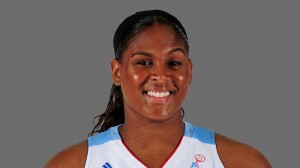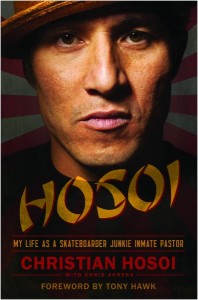 Before there was the X-Games, there was Christian Hosoi. If you don’t understand the cultural relevance of that statement, just ask some of his skateboarding contemporaries like Tony Hawk, who once stated that Hosoi skated “in a way you wished you could, but knew you would never achieve,” and more recent stars like Danny Way who called Hosoi, “the sport’s first rock star.”
Before there was the X-Games, there was Christian Hosoi. If you don’t understand the cultural relevance of that statement, just ask some of his skateboarding contemporaries like Tony Hawk, who once stated that Hosoi skated “in a way you wished you could, but knew you would never achieve,” and more recent stars like Danny Way who called Hosoi, “the sport’s first rock star.”
But while Hawk, a fellow skateboarding pioneer from the ‘80s, was busy becoming an icon, Hosoi was running from the law. A life of substance abuse and poor financial decisions finally caught up with him in 2000 when he was arrested for smuggling illegal drugs across state lines. After five years in the federal penitentiary and a life-changing encounter with God, Hosoi emerged a changed, check that, a radically changed man.
I first met Hosoi via a phone conversation in late 2004, just a few months after he was released from prison. That interview resulted in an article for Relevant magazine. It was obvious then that his conversion was about to set off a chain reaction within the staunchly rebellious skateboarding world. Eight and a half years later, my suspicions have been fully vetted. Hosoi has brought increased attention to a burgeoning group of action sports stars at the forefront of an evangelistic movement that has spawned, among other things, Livin’ It, the Uprising and the Sanctuary in Huntington Beach.
In this Inspiring Athletes interview, Hosoi looks back at his days in prison, why he is still one of the most respected names within the skateboarding world, and how he hopes his autobiography Hosoi and a cameo in the new movie Hardflip will continue to open doors to reaching others with the Gospel:
Chad Bonham: How would you compare your spiritual transformation while in prison to the seven years of spiritual growth you’ve experienced since your release?
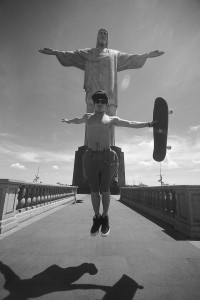
Christian Hosoi: In prison, you have less distractions. Obviously it’s more of a pressure chamber, but usually, time takes advantage of everyone who goes to prison. But I took advantage of my time. I studied and I prayed and I fasted and I did every correspondence course that I could. I went to every single person who came in to preach to us and evangelize us and I tried to read every translation of the Bible that I could get my hands on. I’d have five Bibles out at a time spread out on my triple-decker bunk bed just comparing them. I’d never read a Bible. I’d never been to church. I never understood what that all was. I even used a King James dictionary to understand every word that was in the King James Bible. I studied all of that and it was a blessing.
So when I got out, I was prepared. I knew that all eyes were going to be on me. Everyone was predicting what was going to happen with my life—that I was going to get back into drugs, that I was going to get back into the scene or that I was going to leave the Bible in the prison as I walked out the doors. But it was the Word of God that radically transformed my life on the inside. It didn’t matter if I had a Bible with me, or if I didn’t bring it out. The Bible was written on the tablet of my heart. It’s bound around my neck. I had this radical transformation that has set me on a course to be able to share the Gospel with somebody like myself prior to coming to know the Lord. I want to be relevant to culture but I want to stay relevant to God’s Word and that never changes. We’ve got to be radical in both areas. That means we’ve got to be biblically obedient. We’ve got to be held under a high standard and we’ve got to present the Gospel in a way that’s attractive but not compromising the Word. If Jesus really did save me from my sins and if He’s delivered me from drug addiction and living a self-centered life and brought me to a life of purpose and passion and redemption and hope, I should be jumping up for joy. I should be exuberant. I should be so enthusiastic about life. And then when I face life’s difficulties and struggles, I’m going to go through it with a whole different perspective because I’m aware of where I’m headed.
So when I got out, I was determined to be able to preach the Gospel. I was determined to be a living example. Some people who have never read the Word will see us and they will see the very character and nature of God and it will touch and pierce their heart because they’ll see the contrast between how the world lives and how a person who follows Christ lives. So I just wanted to be real. I didn’t want to be a poser. I didn’t want to be a hypocrite or all these things that people throw on Christians. I think it’s unfair at times because when there’s one bad apple they throw out the whole bunch. For me, I just want to be strong. I want to be prepared. I want to be ready to give an account of the hope that’s in me. I want to be ready to rightly divide the Word of truth.
These are things that I’m so passionate about so when I got out, I got plugged into a church—Sanctuary Church. I got a pastor. Pastor Jay Haizlip is my pastor. I got connected to the Body (of Christ) and I immediately started serving. I was so passionate about preaching the Gospel. I got ordained to be a minster a year after I got released. I was completely dedicated and committed to the cause, to serve and be a servant of the Lord Jesus Christ. God calls and man affirms and now we have the process of accountability to be sure that we are not only talking the talk but that we’re walking the walk.
So for me, this is really an honor and a privilege to be able to live a Christ-like life. I’ve got Heaven awaiting me at the end of my journey here. I’m just passing through. This is exciting. It’s adventurous. I’m thrilled just to be alive. Most people don’t survive the amount of things that I’ve done to my body pertaining to drugs. It’s just unheard of, and I’m so thankful that I got a second chance.
Bonham: When you got out of prison, you had a seven-year old son (now 14) waiting for you. How have you been able to use these last seven years to teach him life lessons based on your past experiences?
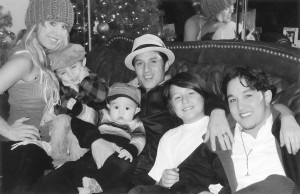
Hosoi: When I went in, he was a year and a half. He had no recollection other than seeing me briefly. Now that I can pour into him and raise him up in the Lord as a child of God, I think he’s got such a greater advantage that will help him not go down the path that I went down. I can teach him that there’s nothing at the end of that path but destruction and heartache and pain. I am an open book to my children and I let them know the circumstances and the repercussions of the choices I made in my life.
And I do that with everyone. I consider myself a father to this generation. The skateboard culture is so radical and so individualized and rebellious and wanting to be creative and artistic and all of these things that are awesome, but if they don’t have somebody trying to lead them in a way that will preserve their life and show them how to be all that they can be, they might never ever find that in the path that they take. So I want to be here as a father, not only to my children, but also to this generation as an example of what it looks like.
Bonham: Were there any concerns about how much detail to include in your book?
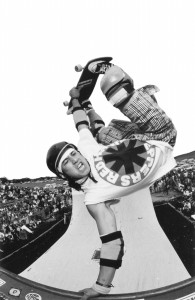
Hosoi: I wanted to get into the very deepest parts so I could show people the comfort I’ve received from God. My life is an open book and a testimony of what to do and what not to do. I have no mixed emotions about what I’ve done in the past. I have no regrets. I couldn’t be where I am today without the choices I made in the past. It’s not that God wanted me to go through what I went through so that I could have some sort of hardcore testimony that people could relate to. But He can use it now that I’ve made a choice to live for Him. It’s a blessing now. I believe that everything happens for a reason. There are no coincidences. Everything has been divinely orchestrated by God. He didn’t want me to go to prison but because I made that choice, there was a process that I had to go through. I took a hold of my life and I gave it to God and I said, “God, do as You will. I want to do Your will, not my own.” That’s when he brought me to where I am today.
And that is a great example for those that want to change their life. That’s how I can tell people that God is real. God has changed my life. 13 years ago, if you would have said, “Christian, you’re going to be a pastor. You’re going to be preaching the Gospel. You’re going to changed and sober,” I would have bet my life against it. My life is almost like the punk rock revolution in its attitude. I’m rebelling against what people say is normal. I’m actually going against the tide and against the culture and saying, “No!” I can be a hardcore, sold-out Christian and still skateboard. I can still go out into the street. There’s this bubble that people think Christians are in, but God called us to go out and preach the Gospel to every nation and lay hands on the sick and they will recover and cast out devils in His name. The transformation from when I got out of prison to today is light years ahead because I’ve put all the knowledge that I received to work so I can be the hands and feet of Jesus. It’s just amazing to see how many people are eager and desperate to hear something that lasts, to hear something that has eternal value.
Bonham: Why do you think that, despite not necessarily being aligned with your spiritual beliefs, a skateboarding icon like Tony Hawk would agree to write your foreword and other popular skateboarders like Danny Way would endorse the book?
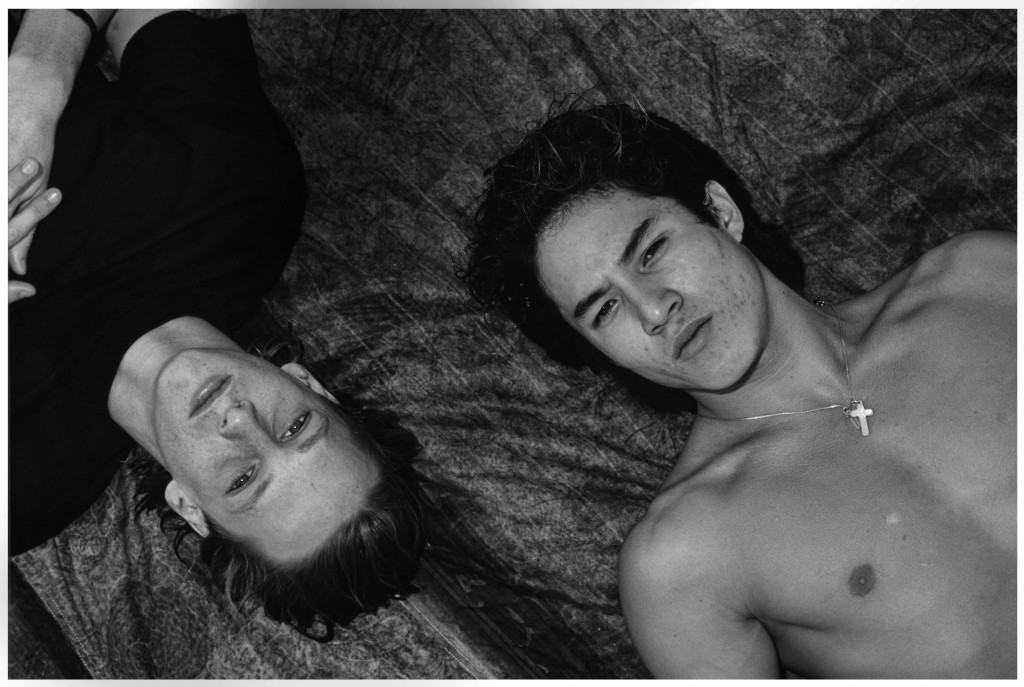
Hosoi: I think it’s because I respect and love them, and they return the same respect and love. I think that goes for everyone who is on this planet. We have this continental divide between us the people we’re trying to reach. Say I’m trying to preach the Gospel, I don’t around being judgmental or critical. I’m don’t condemn people. I think that’s where the respect and the love comes across as true, real, genuine and sincere. I think that’s how we need to be as Christians, I believe that’s how Jesus was. I believe He was firm when He had to be firm, but He was always loving when He was trying to reach people and touch their hearts. That’s how I want to be with my friends, guys like Tony Hawk and Danny Way and anyone else. I respect and love them, first and foremost. Because of that, I’m receiving that in return. It is truly an honor for all of them to have a part in this project. It really does touch my heart that they would speak highly of me.
Bonham: Are there any specific instances where your testimony has touched an individual?
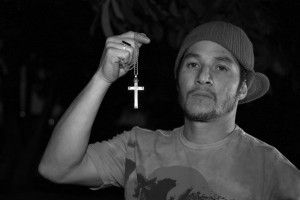
Hosoi: It’s such an honor to be a soldier, to be an ambassador for the Lord Jesus Christ. I’m speechless at times when I think about it at times. All I can do is say, “Thank You Lord!” All I can do is say, “I love You Jesus!” It just astounds me that I have this second chance to be able to even tell Him I love Him, let alone that I have the promise of eternal life. That right there gives me all the energy, all the passion, all the compassion for this world. I want to make a difference. I want to reach out and touch as many people’s lives as I can.
Bonham: How important is it to take advantage of the platform afforded you because of your part in skateboarding’s unique history as well as your personal testimony?
Hosoi: Every opportunity is special. I was recently in Kansas City and got to preach and share my story at a skate park that had 300 people there. We got to have a contest and give away some prizes and then I got to microphone and share the Gospel with them and over 75 of them, kids and adults, gave their lives to Christ or rededicated their lives to Jesus. And then the week before that, I was flying to an event and the guy next to me recognized who I was. And I just got to share my story and right then and there I asked him if he believed in God and I got to share the Gospel with him and I led him to Christ right there on the plane. Both opportunities were as special as the other. I look for those opportunities on a daily basis.
Bonham: Talk about the movie Hardflip and how you were able to be involved?
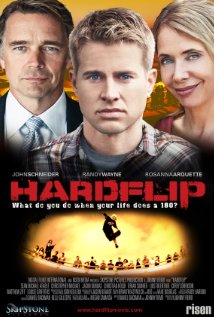 Hosoi: Any type of faith-based project is something that I’d love to be a part of. When skateboarding is involved, it just makes it that much greater. God is going to use as a tool to reach people. The movie touches on a lot of relationship issues whether it’s father and son or mother and son. It’s about forgiveness and reconciliation. It’s about these things that everyone deals with on a daily basis but no one is talking about. So when you present it in a movie that can take you on a ride that really speaks to your heart, that’s when you have a great project that I think is going to be able to minister to a lot of people. I was blessed to have a cameo and do what I did in (the 1986 movie) Thrashin’ but now I’m able to do it as a man who is standing for integrity.
Hosoi: Any type of faith-based project is something that I’d love to be a part of. When skateboarding is involved, it just makes it that much greater. God is going to use as a tool to reach people. The movie touches on a lot of relationship issues whether it’s father and son or mother and son. It’s about forgiveness and reconciliation. It’s about these things that everyone deals with on a daily basis but no one is talking about. So when you present it in a movie that can take you on a ride that really speaks to your heart, that’s when you have a great project that I think is going to be able to minister to a lot of people. I was blessed to have a cameo and do what I did in (the 1986 movie) Thrashin’ but now I’m able to do it as a man who is standing for integrity.
Bonham: I know you have many years of ministry left and your story is still a work in progress, but it seems like the new book and this movie coming out at the same time is almost a culmination of that 180-degree turn your life took seven years ago.
Hosoi: If Jesus doesn’t come back (soon), it’s just the tip of the iceberg. (Laughs)
Bonham: What’s the latest news from the Sanctuary?
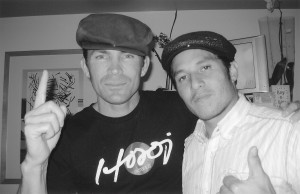
Hosoi: We just launched a new downtown L.A. extension service. Downtown L.A. is a hardcore place. We’re meeting in the Alexandria Hotel on Spring and 5th. It’s amazing. The first week, it was standing room only. I was preaching the Gospel in Kansas City but I heard it was an amazing night. A guy came in who was blind and he received his sight. These are the things that are happening in our current day. People are so ready for something radical and for something to shake the foundation of what they think is real. The only thing that’s truth is the Lord Jesus Christ. When we preach and lift His name high, it will draw all men unto Him. We are doing that. We’re excited about the future of the Sanctuary. The vision is to plant 200 churches in all the major cities of the world. That’s our goal.
Bonham: What’s going on with your skateboarding business these days?
Hosoi: I have my own company called Hosoi Skateboards that I started last year. I’ve got a team. I’m working on some potential skatepark projects. I’m working on a potential clothing line. I’m just having fun. Those are my dreams and I’m dreaming big. I want to see God do some more radical things in my life. I’m looking forward to the horizon. What’s coming tomorrow? I’m not worried about tomorrow, but I’m planning for tomorrow. I’m excited about my future and what God’s going to do.
